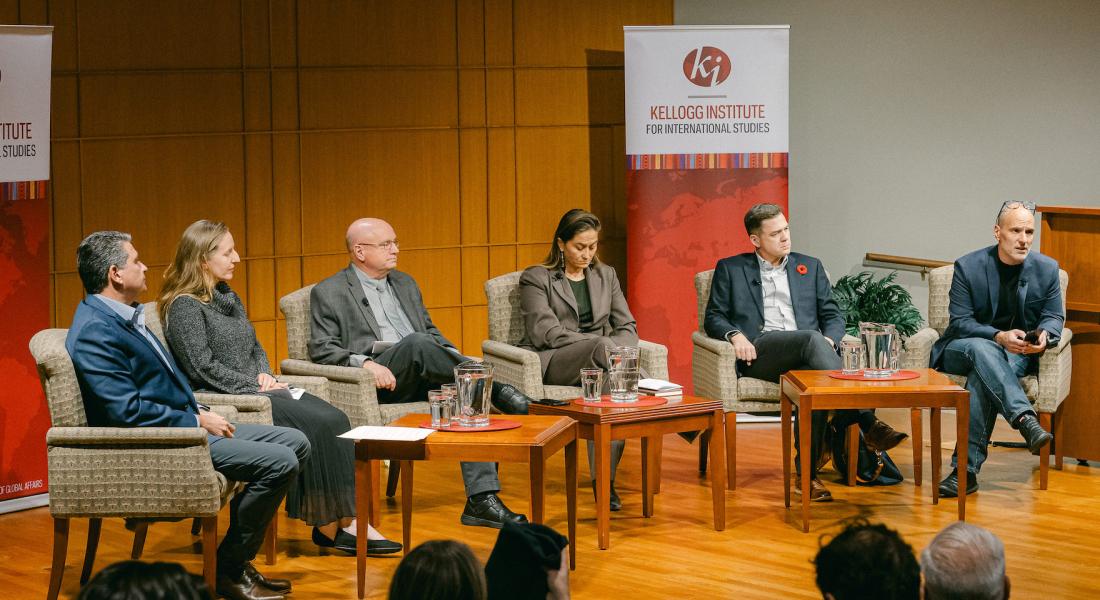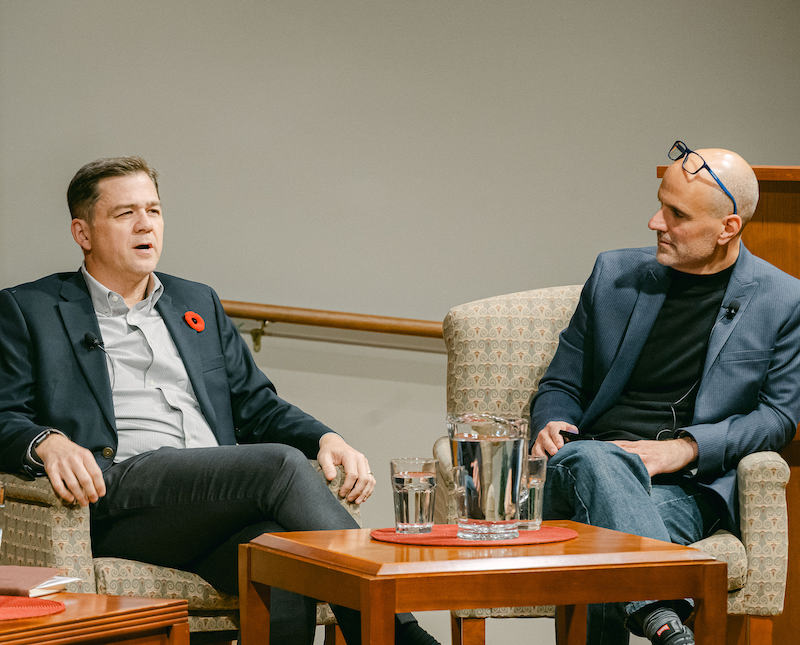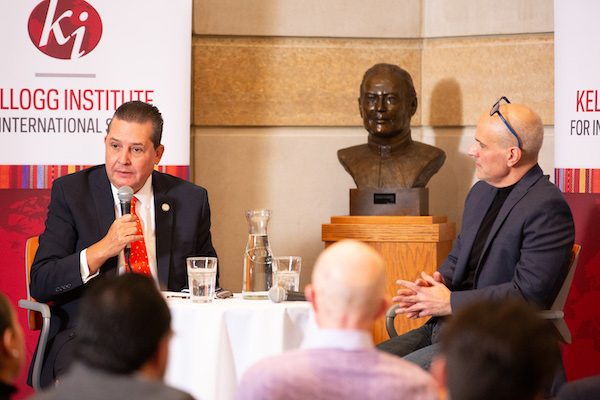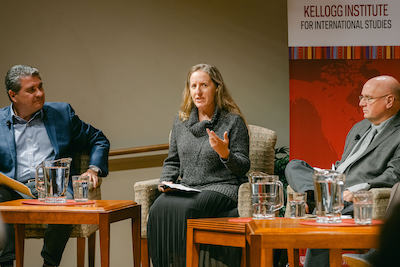
The Kellogg Institute for International Studies, part of the Keough School of Global Affairs, plays a key role in the University of Notre Dame’s new Democracy Initiative. This initiative will advance the study of democracy by unifying and expanding existing University projects, including work by the Kellogg Institute and by the Rooney Center for the Study of American Democracy. Within the Keough School, Kellogg is investing significant funds to build on its strong academic foundation in the study of democracy.
“We are truly in a time of democratic crisis in the world and here in the United States. Confidence is waning – that’s been true for a long time, but it has accelerated in the past few years,” says David Campbell, Packey J. Dee Professor of American Democracy and director of Notre Dame’s new Democracy Initiative that was launched in support of the themes announced in the university’s new strategic framework.
“This initiative examines local and global threats to democracy and explores how best to build and support effective states, expand political participation, strengthen the rule of law, improve the protection of human and civil rights, and enhance cooperation across national borders,” says Campbell. “As a faith-based university, Notre Dame has an opportunity that is arguably unique among other institutions of higher education, and the Kellogg Institute has a very strong track record, a well-deserved reputation of excellence in the study of and promotion of democracy around the world.”
One of the Kellogg Institute’s principal efforts under the initiative’s banner is establishing an annual Global Democracy Conference (GDC) to facilitate conversations and collaboration between scholars, policymakers, and religious leaders.
This year the conference will be held May 20-22 to foster discussion among democratic leaders and scholars through roundtables and academic panels. The event will be hosted this year on campus, but will likely be held at the Keough School Washington Office or at one of Notre Dame’s international sites in future years.
 “I don’t think we can address the challenges of democracy by reducing them to a single analytical perspective,” said Aníbal Pérez-Líñan, director of the Kellogg Institute. “The problems that democracy is confronting today are not the exclusive intellectual domain of any discipline, and Notre Dame is in a unique situation to convene dialogues between scholars, policymakers, and opinion leaders from different positions in the ideological spectrum.”
“I don’t think we can address the challenges of democracy by reducing them to a single analytical perspective,” said Aníbal Pérez-Líñan, director of the Kellogg Institute. “The problems that democracy is confronting today are not the exclusive intellectual domain of any discipline, and Notre Dame is in a unique situation to convene dialogues between scholars, policymakers, and opinion leaders from different positions in the ideological spectrum.”
The conference includes panels and roundtables, organized in three thematic blocs around ‘New Ideas,’’ “The State of the World,” and “The Path Forward.” They feature representatives from academia, nongovernmental organizations, policy, the media, and more. Keynote speakers include Juan Sebastián Chamorro, former Nicaraguan politician and political prisoner; Helena Carreiras, minister of defense for Portugal, and Luis Almagro, secretary general of the Organization of American States.
Democracy Research
When the Kellogg Institute was founded 40 years ago, much of its scholarship explored and promoted how authoritarian governments could transition to democracy. In a period of global democratic recession that began about 15 years ago, authoritarian powers in Latin America, Europe, Africa, and Asia have become emboldened on the global stage, presenting new challenges for scholars and practitioners of democracy. At the same time, societies have grown increasingly polarized, generating new threats to democracy in the United States and elsewhere that were unimaginable not long ago.
Against this backdrop, today the Kellogg Institute is working to understand how democracies evolve and devolve, how to promote healthy, thriving democracies, and how to prevent democratic governments from receding into authoritarianism.
“We are increasingly observing situations across the world in which elected governments use their democratic legitimacy to dismantle their democracy from the inside, and it is that process of democratic erosion, democratic backsliding, that is the main concern for scholars nowadays,” Pérez-Líñan, said.
Interdisciplinary Approach
“Kellogg has 40 years of deep reflection on democracy and human development and is very well known among international audiences for questions of democracy,” Pérez-Líñan said. “Especially through our Visiting Fellowship program, we have developed a vast global network of scholars who collaborate with and respect Kellogg.”
In addition to its Visiting Fellowship program, the Kellogg Institute funds undergraduate engagement and post-doctoral and PhD student research focused around the theme of democracy. Kellogg’s Policy and Practice Research Labs explore democracy and human development, producing research intended to have tangible influence on policies and practices. And, its Research Clusters – including one specifically dedicated to democratization – arose from three-year grants to promote interdisciplinary research. Kellogg also supported the creation of the ambitious international effort, the Varieties of Democracy Project, which provides the world’s most comprehensive, accurate, and detailed democracy ratings all the way back to 1900. Kellogg now serves as the project’s regional center for North America.
The Kellogg Institute has just funded two new Keough School faculty members in positions created to support the Democracy Initiative and plans to help create more faculty positions over the next decade. The institute also will expand its democracy programs incrementally by funding two more visiting fellows, two post-doctoral positions in collaboration with the Democracy Initiative, and new PhD students, and by engaging more undergraduate students in international work and experiential learning in democracy.
Promoting Democracy Education at Notre Dame
 Leading up to the Global Democracy Conference, the Kellogg Institute has sponsored several events to help educate the campus about global democracy issues and promote scholarly debate. In January, the institute hosted Francisco Guerrero, the Secretary for Strengthening Democracy for the Organization of American States (OAS), for a dinner and dialogue event that explored the state of democracy in the Americas, as well as ways to strengthen the Institute’s relationship with the secretariat and with the OAS more broadly. In March, Kellogg co-sponsored an event at the Washington Office of the Keough School of Global Affairs titled “Digital Democracy: Defending Democracy with New Deliberative Technologies” that featured a keynote address by Nobel laureate Maria Ressa, CEO of Rappler.
Leading up to the Global Democracy Conference, the Kellogg Institute has sponsored several events to help educate the campus about global democracy issues and promote scholarly debate. In January, the institute hosted Francisco Guerrero, the Secretary for Strengthening Democracy for the Organization of American States (OAS), for a dinner and dialogue event that explored the state of democracy in the Americas, as well as ways to strengthen the Institute’s relationship with the secretariat and with the OAS more broadly. In March, Kellogg co-sponsored an event at the Washington Office of the Keough School of Global Affairs titled “Digital Democracy: Defending Democracy with New Deliberative Technologies” that featured a keynote address by Nobel laureate Maria Ressa, CEO of Rappler.
Additional presentations this year have included a panel discussion on democracy and organized crime in Ecuador, and the sponsorship of the second “Congreso sobre Democracia y Derechos Humanos en América Latina” held in Colombia, and of events commemorating the 40th anniversary of Argentina's democracy and honoring Guillermo O'Donnell, the Kellogg Institute’s founding academic director, among others. And, still to come this spring are panels on the South Asia elections and on the implications of the 2024 general election in Mexico.
Challenges
To kick off the institute’s work on the Democracy Initiative, in early November Kellogg hosted a special event. The panel “Global Democracy at Risk: Why it Matters and What Can Be Done” featured Notre Dame scholars who discussed the issues and challenges facing democracies today. In addition to Campbell, Kellogg Faculty Fellow and Associate Professor of Political Science Jamie Bleck, Assistant Professor of Global Affairs and Kellogg Faculty Fellow Susan Ostermann, Hewlett Visiting Fellow for Public Policy Juan Sebastián Chamorro, and Marilyn Keough Dean Keough School of Global Affairs R. Scott Appleby participated in the panel discussion moderated by Pérez-Líñan.
 Bleck’s research centers around electoral politics, citizenship, governance, and political behavior in Africa. She raised several questions for scholars to tackle in the coming years about the democratic process. Ostermann, whose work focuses on democracy in India, pointed to some areas where democracy is working and raised concerns about the subtler early signs of democratic decline and violation of religious rights there. Chamorro, a Nicaraguan economist, businessman, and politician who was imprisoned and banished from his country, agreed that the suppression of the press and violation of rights is a rising problem, especially in Latin America. Appleby, whose work focuses on the relationship of global religion to peace, conflict, and integral human development, emphasized the complexity of the challenges facing democracy and how these challenges can only be properly addressed through collaboration across diverse disciplines and ideologies.
Bleck’s research centers around electoral politics, citizenship, governance, and political behavior in Africa. She raised several questions for scholars to tackle in the coming years about the democratic process. Ostermann, whose work focuses on democracy in India, pointed to some areas where democracy is working and raised concerns about the subtler early signs of democratic decline and violation of religious rights there. Chamorro, a Nicaraguan economist, businessman, and politician who was imprisoned and banished from his country, agreed that the suppression of the press and violation of rights is a rising problem, especially in Latin America. Appleby, whose work focuses on the relationship of global religion to peace, conflict, and integral human development, emphasized the complexity of the challenges facing democracy and how these challenges can only be properly addressed through collaboration across diverse disciplines and ideologies.
Bright Spots
The state of democracy around the world is not all bad news. Campbell points to local and state governments in the United States that successfully “work together across differing political party affiliation and ideological persuasions to get things done.” And he’s hopeful about how “undergraduate students show an appreciation for what it means to be a part of a democracy.” Ostermann pointed to several examples where procedural democracy was submitting to checks and balances. Pérez-Líñan adds that there are sure signs of progress in different places if you know what to look for.
“There’s a process – a slow, but consistent process – by which the rights of the population are expanded,” he said. “This is how democracy grows and gets stabilized over time. There’s always a dialogue, which is not easy, involves a lot of tension and debate, cooperation from different positions on the left and right, and negotiations about the possibility of expanding citizen rights to new horizons.”
That’s the kind of world the Kellogg Institute seeks to promote in its study of democracy and human development, and that’s why, in collaboration with other institutes and departments across campus, the institute is committed to investing more funding and efforts toward understanding the intricacies of what makes for a healthy democracy and how to put those findings into practice.
The Democracy Initiative is a timely and natural progression of what the Kellogg Institute set out to do 40 years ago when it was founded.
“Kellogg is the model for what this initiative can accomplish,” says Campbell.





